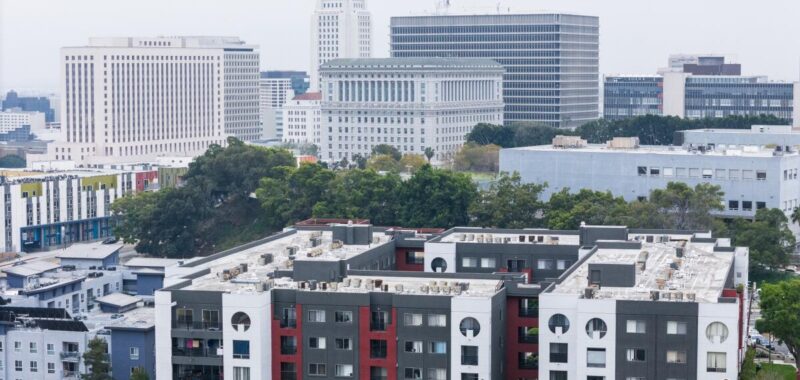Residents who have been fighting huge rent increases at a Chinatown apartment complex could find some financial relief under a tentative deal reached between Los Angeles housing officials and the landlord.
The proposed agreement would require the city to spend nearly $15 million to ensure that rents are subsidized in dozens of units inside the Hillside Villa Apartments, according to a memo issued Friday by the city’s housing department.
The agreement would run through February 2034 and cover 106 of the building’s 124 units. For some renters, the subsidies would close the gap between the amount they were paying in 2019 and the market-rate rent the landlord wants to charge, city officials said.
The subsidy would not cover 17 apartments where tenants are already paying market rate or one unit reserved for the building’s manager, the report said.
The deal, if approved by the City Council, is designed to resolve a long-running battle over steep rent hikes announced several years ago by 636 NHP LLC, the building’s owner. The company sought those increases following the expiration of a 30-year agreement with the city that had restricted the building’s rents.
The new agreement would effectively scuttle efforts by tenant advocates to have the city acquire Hillside Villa using eminent domain, the legal process used by government agencies to force property owners to sell.
Ann Sewill, general manager of the Los Angeles Housing Department, warned the council in her memo that if the city completed a purchase of Hillside Villa, the cost of acquisition, renovations and refinancing would reach nearly $93 million. She also pointed out that the owner has no interest in selling.
“The purchase of the property from an unwilling owner would be a long, expensive and legally uncertain process, resulting in much higher acquisition costs,” she wrote.
The proposal will be taken up by the council’s housing committee Wednesday before reaching the full council.
Councilmember Eunisses Hernandez, whose district includes Chinatown, declined to say whether she supports the agreement. An aide said Hernandez is still reviewing it.
“She is eager for the tenants — who are the directly impacted parties — to have an opportunity to weigh in and for this to be discussed in a public forum at council,” said Chelsea Lucktenberg, a spokesperson for Hernandez.
Sewill said her agency’s proposal would give the city the first right of refusal to purchase the building if the owner decides to sell at any time before February 2037. The deal would also give tenants six years to finish paying back rent owed from the period between 2019 and 2024.
If those tenants enter into a repayment agreement and make the required payments over the six-year period, the owner “will not seek to evict tenants for unpaid rent covered by that agreement,” the report said.
Tenant advocates have spent several years pressuring city leaders to forcibly purchase Hillside Villa, staging protests at their homes and elsewhere. They launched their campaign after the building’s mostly Latino and Asian residents, many of them elderly and low income, received notice that their rent would double or even triple.
On Friday, one tenant advocate voiced disappointment in the city’s proposal, saying she is especially concerned that tenants are still being asked to pay back unpaid rent.
At this point, 35 households are facing eviction, said Annie Shaw, an organizer with Chinatown Community for Equitable Development, a group that has been working closely with Hillside Villa tenants. Several others owe back rent but have not been served with legal paperwork, she said.
“This [agreement] is very far from what the community really needs,” she said. “Eminent domain would have been a far better solution.”
Shaw and a handful of Hillside Villa tenants showed up at Friday’s council meeting to present their own list of demands, calling for unpaid rent to be 100% forgiven. They also said any agreement to subsidize rents should remain in place for 99 years.
Mary Ramos, a resident of Hillside Villa, said a deal to establish rental subsidies through 2034 would not be enough.
“I am 73. I will be 83 by that time,” she told the council.
Thomas Botz, the managing member of 636 NHP, declined to discuss the specifics of the proposed deal, saying Friday that it “speaks for itself.”
“I hope the tenants appreciate what Ann Sewill is doing for them and the city, and will not be misled by the [tenant] organizers,” he said.
Hillside Villa already accepts Section 8 rental vouchers at 68 of the building’s units, according to the housing department.
Former Councilmember Gil Cedillo, who represented Chinatown for nearly a decade, launched the effort within City Hall to purchase Hillside Villa in 2020, after an earlier round of negotiations with Botz broke down. Two years later, while locked in a tight reelection campaign, Cedillo persuaded his colleagues to take the first step toward a purchase by seeking an appraisal of the building.
Botz resisted the city’s efforts to get inside the building to assess its condition, setting off a drawn-out legal battle that delayed the appraisal for more than a year.

